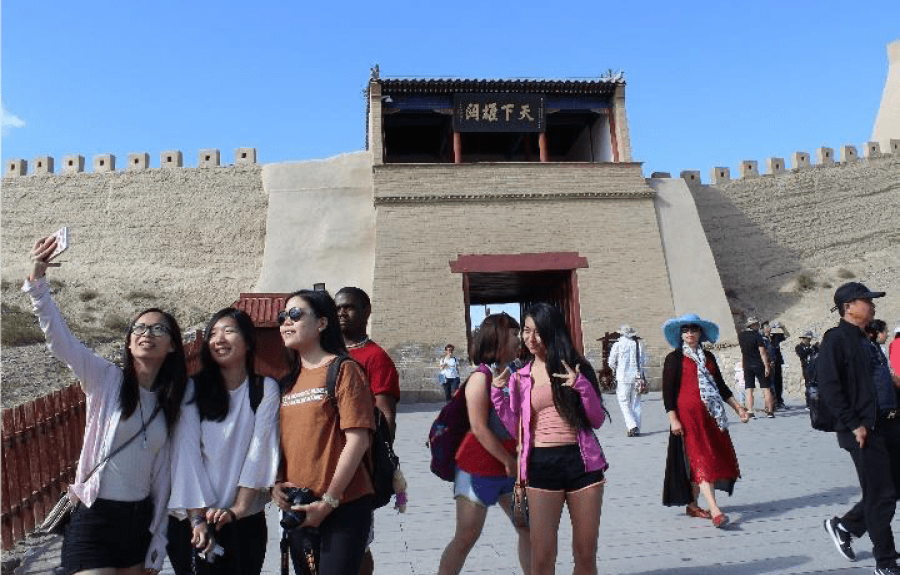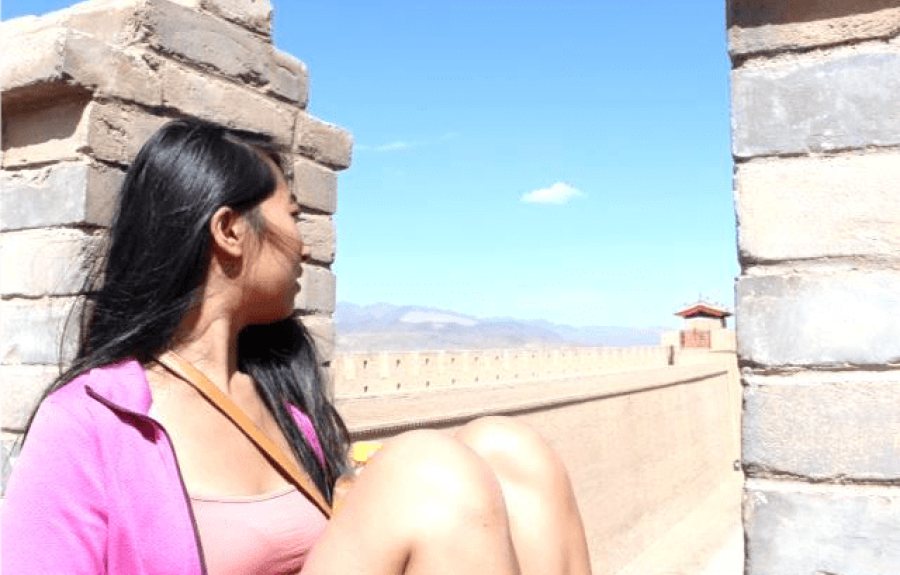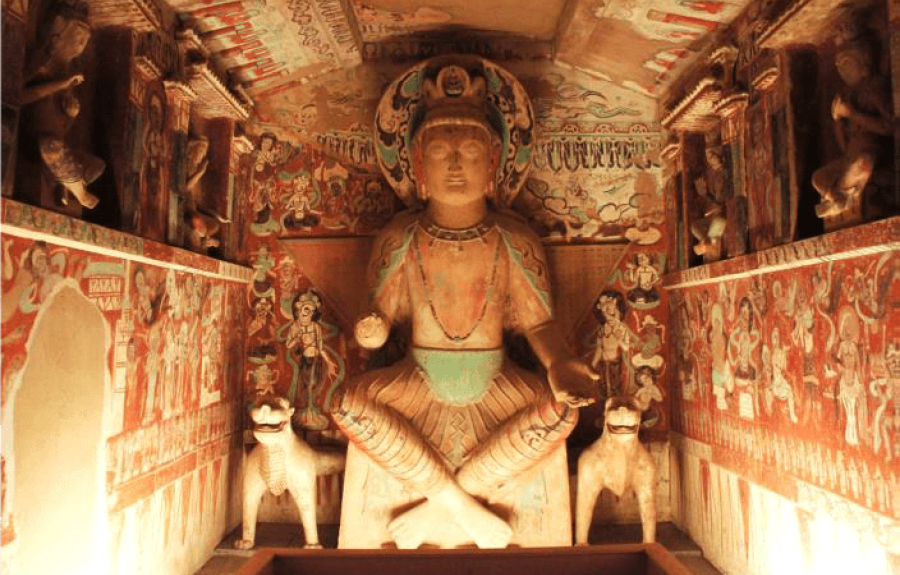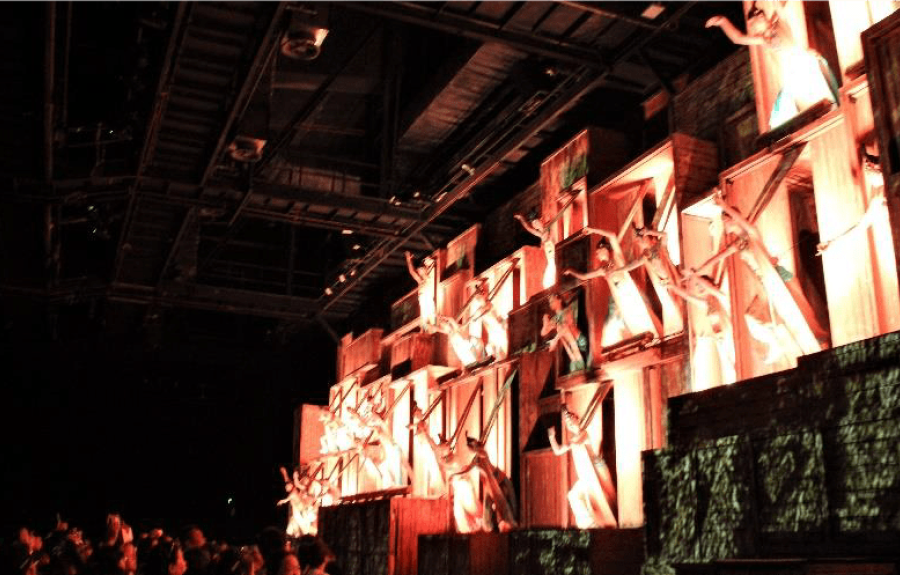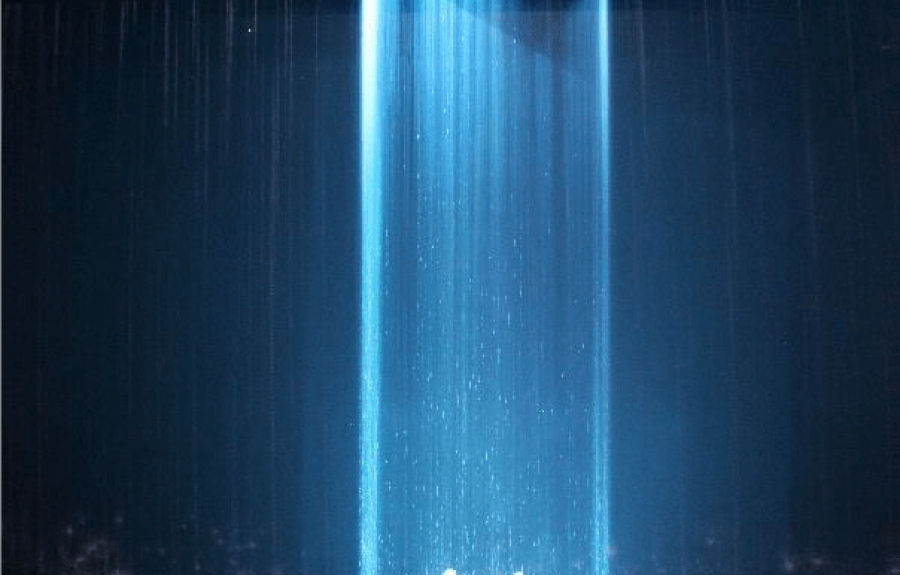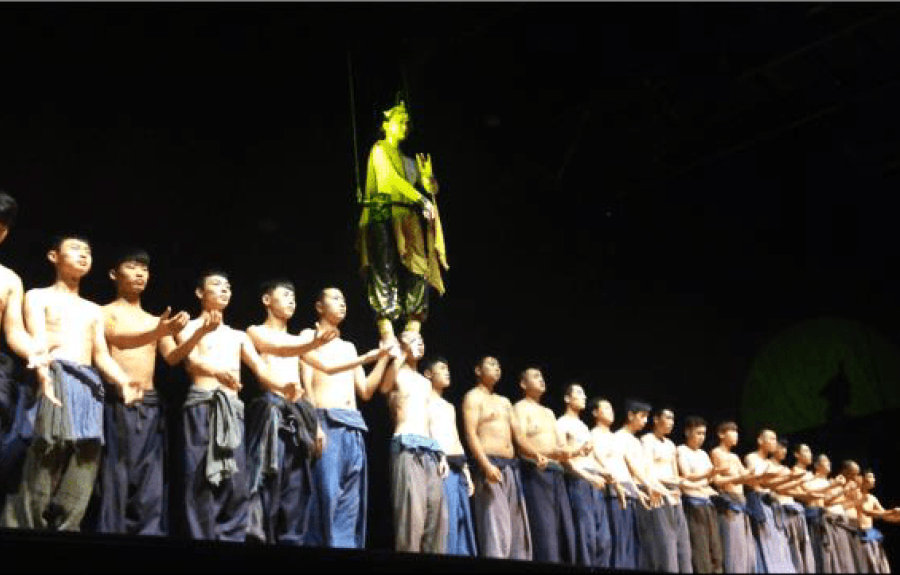DAY 1 (9/1) Walking into Jia Yu Guan, I didn't realize that the walls contained an entire city. I didn't realize that inside those walls, people watched opera, ate food, participated in the Silk Road trade, and defended the fort. Inside those walls lived soldiers and civilians alike. All of this information fascinated me.
I'm especially intrigued because I myself have actually always wanted to live in an enclosed area, a place where the boundaries are very clearly demarcated, where I feel completely safe and secure and can interact closely with my neighbors. There's something about a gated community, about an enclosed space, that really speaks to me. It's actually part of the reason Columbia University was one of my top choices for college. I loved the fact that it was a gated campus; it seemed so nice and cozy. Don't get me wrong, I absolutely love Cornell's campus; I walk to class every day looking at the gorges and thinking about how lucky I am to be at a university not only where academics are strong, but also where the scenery stands unparalleled to other college campuses. However, one thing about Cornell bothers me-and that is its lack of gates around the campus. You don't know where Cornell begins and where it ends. You don't know where you are officially off Cornell University property and where you are on it again. This bothers me a bit, and it bothers me in a way that I can't quite express into words, so I will attempt to express in examples that I've experienced throughout my life.
This is also one of the reasons why I love Beida's campus. It is closed off from the public and guarded by security. I feel safe at Beida. It is like a small community where I can find likeminded people if I wished. I can let my guard down and utilize the mental energy I have on other thoughts and ideas. In a way, this is where I can find true intellectual freedom. It is through the peace I feel from such security.
For as long as I can remember, actually, I have always sought that sense of security and comfort. I specifically remember sitting on the floor of my old apartment when I was three years old. Of all the hazy memories I have from my childhood days, this one stands out crystal clear. I was sitting there, and all of a sudden, this feeling of security and comfort and protected ness washed over me. I just sat there and relished the feeling. To this day, I have not felt such a strong sense of security as I did eighteen years ago on the floor of my old apartment.
Maybe this can explain why the fact that Jia Yu Guan is essentially a little city enclosed within walls fascinates me so much. I can just imagine myself as a child playing out on the streets with the other neighborhood children, kids I had grown up with. The sky gets dark, but we don't worry because our city is built within walls, our boundaries guarded by the night soldiers. Our mothers only call us to come home when it is time to sleep. As kids, we walk and skip and run all over the city, playing tag and hide-and-seek. We greet the merchants and soldiers and government officials as we chase each other around town. Everyone knows us by name, and everyone watches out for another.
Maybe I'm an old soul. Or maybe I just want what I can't have. In America, I live in a suburban neighborhood. I grew up there-I went to elementary, middle and high school while living in that house. Before, we used to have annual gatherings with the neighbors. However, now that most of the kids have grown up, many of my old neighbors have moved to other places. I now barely know my new neighbors. I miss that sense of community, I miss my old neighbor who acted like a grandpa to me and my brother, I miss knocking on my friends' doors after school and asking them to come out and play. And I realize only now that Jia Yu Guan has evoked these emotions that have for so long been left as abstract blobs in my mind. I am only now attempting to dissect this blob and turn it into words; I am only now trying to truly express those emotions.
Overall, I loved being in Jia Yu Guan, I loved the feeling it constantly gave me, everywhere I walked. This journal entry here is my attempt to share it with you as well.
Walking into Jia Yu Guan, I didn't realize that the walls contained an entire city. And when I figured that out, it was like a whole new world opened up to me.
DAY 2 (9/2) Part I: Mogao Grottoes Walking in the Mogao Grottoes and seeing the cave paintings and statues, I felt anxious. Anxious and impatient. At first, I couldn't pinpoint why. I figure it might be because I was tired after riding camels in the sand dunes. However, it was a few moments later that I realized it was because of a different reason.
Walking into the caves, you feel a rush of cold air, welcoming you into the depths of the caves. You then look up to see the statues of the Buddhist gods, towering above you. For me, looking up and seeing these majestic creations really humbled me. I thought about how the creators of these statues must have perceived those Buddhist gods. These artists must have seen these gods as all-powerful; the human was so small and so insignificant in a world with these gods. I loved that I could walk into these caves and get a little glimpse into how these Chinese people felt meditating and worshipping within these caves.
The thing was, with the hustle and bustle of the tourist attraction-the chattering of the tourists, the authoritative voices of the tour guides-it was hard for me to really achieve that feeling of peace and worship. I'm someone who loves being able to put myself in other people's shoes. In other words, I value empathy on a very high level. And for just one moment, I wanted to feel what it was like worshipping and walking in that cave in the Song Dynasty or what it would have been like to stumble upon such a treasure and wander into these caves of such artistic intricacy and humbling creations. But my environment of tourists and babies and guides and cell phones made it nearly impossible.
That's actually okay though, because at the time, I didn't realize I would stumble upon such a spectacular (精彩) show later that day. The show was absolutely amazing. I told my friend that Broadway shows pale in comparison to what I just watched. The intricate costumes, the seamless transitions, the pure emotion. It all lined up so flawlessly; I was left stunned. I told Erika that even had I not understood a single word of the show, the pure aesthetics and theatrics would have more than made up for it. There are so many things I want to talk about regarding the show, but I'm only going to talk about one here (for the sake of my time and yours; otherwise, I might just accidentally write a small novel on my thoughts regarding the show), and that is my thoughts on Buddhism. Throughout the course of the show, as well as through talking to our tour guide, I realized my personal thoughts in the past few months have been incredibly similar to those of Buddhist thought. Here, I will share three similarities that blew my mind today:
1. Buddhists believe that everything is a cycle. The show had one Chinese saying, "千年 一瞬间," which roughly translates to "a thousand years in one second." This is essentially saying that everything in life is transient; nothing is permanent. The friends you have now will most likely not be the friends you have in five years. You are going to have a child; that child will someday die. And you will too. And this is all perfectly okay. That is the cycle of life. As humans, we must accept and move on. In fact, in some cases, we must accept in order to move on. While I completely agree with this sentiment, there was a point in my life, a few years ago actually, where I became incredibly depressed out of nowhere. It was during the summer. I remember just thinking, I go to college every day, go to classes and do homework, then repeat. What exactly is the point of this repetition? When I grow up, I'll go to work and then relax on the weekends. Then repeat. Rinse and repeat. What is the point? How can I live my life knowing that I will simply be doing the same thing over and over again? If this is not some type of Sisyphean torture, I don't know what is. I did eventually come out of my depression, but I still didn't understand fully. Although I was happy with life again, there would still be periods of time where I felt like I was just doing the same thing over and over again. It didn't matter how happy I was at that point; that thought persisted in my mind and would bother me to no end. It was only a few months ago that I realized for me, at least, the point of life is simply to live it-to enjoy what I have right now-to "feel the rain on my skin because no one else can feel it for me," to notice the sunset and have an appreciation for the pinks and oranges and purples that fill up the sky, to smile when my dog sees me and tries to lick me, to love my parents through our FaceTime calls, to listen to beautiful music, to dance my heart out in the middle of the street. The point of life for me is to appreciate it, to live for those small moments that you wish you could freeze and stretch out forever. To me, at age 21, that is the point of life. So in sum, I completely agree with the Buddhist concept of cycles. The concept itself is as beautiful as it is intimidating at times. I realized I just need to find the right balance. While a lot of things we do in life are repetitive and do seem to be in a cycle, that concept of a cycle also reminds us that we will all eventually die and to appreciate the life on Earth that we have now.
2. Buddhists believe every life is valuable-from the smallest ant, to the largest elephant. This leads us to the concept of reincarnation-each living thing is a part of the reincarnation cycle, so in Buddhism, it makes sense that each living thing has value. I have always had a soft spot for animals. As a child, I would avoid going to zoos or aquariums because I had heard that animals were mistreated there. I hated seeing horses in city streets because I knew they weren't meant to be there. In fact, one time, I tried to go full-on vegan. Unfortunately, my mom was not having it and ended up chasing me around the house with some crab meat. I feel that the pain of animals should be taken even more seriously than that of humans because animals do not have a voice. Even as a kid, I hated when kids would kill ants for no reason. Even though I hate spiders and other bugs, I refuse to let my dad kill them upon catching them and would always request to have them released outside the window. I truly believe in speaking up for all lives. We are all on this Earth trying to survive, trying to provide for our families. I actually even feel the same for bacteria and viruses. If you look at it from their point of view, they just want to survive and reproducing is their way of doing so. We are all just on this Earth trying to live, and I honestly think if we all have the same purpose, we can all have a healthy respect for one another, no matter the intellectual capability or physical size. Every life has been and will always be valuable.
3. Buddhists believe that to be truly successful in anything, you need to achieve inner peace first. Buddhist meditation techniques are all ways to achieve that inner peace. Monks are to train their minds so they can achieve that peace. Two months ago, I had a dream where I was taking a walk in a natural park. In general, in real life, I don't do very many things alone, because I prefer the company of another human being; I feel I am truly happy when with others in an exciting setting. However, in this dream, I was walking by myself. I was alone. And I felt this peace, this calm, that I had never felt before. It really was a beautiful moment, and it was upon waking up that I realized that I may be pursuing happiness in life, but the way to achieve that may not necessarily be through constant stimulation and connections with people, but rather via finding inner peace within myself. The feeling I got in that dream was an indescribable type of tranquility, and I would do anything to achieve that again. I feel that the more I grow up, the more I realize that it is peace that I am seeking, not excitement or connections, in order to reach ultimate fulfillment or happiness. It is like how my dad wants to get a vacation house in the mountains and live peacefully after retirement. I had never understood him; I always felt that music concerts and parties were a lot better than some mountains in a lonely place. But now, now I understand how my dad feels. Thus, when inner peace was mentioned regarding Buddhism, I immediately felt a connection. In a way, what I had wanted to feel earlier today-that peace and quiet-is exactly what I'm talking about now.
As we walked through Dunhuang at night, admiring the lights and the water, these thoughts raced through my mind. I was so exhilarated that I had made all of these connections in one day, and I absolutely could not wait until I could get some decent Wi-Fi again and do some real research on Buddhism.
Part II: The Show (又见敦煌) I have always felt more American than Chinese. I was born and raised in America; I have only been to China three times in my life. I speak English fluently; I speak Chinese conversationally at best. I think and dream in English; I use Chinese only when talking to my grandparents. Almost all of my friends are American; even with my native Chinese friends, I speak English. I crave macaroni and cheese and cheeseburgers and mozzarella sticks and pizza; I used to dread dinner every day as a child because I didn't like Chinese food and wished every day that my parents could cook some American food. I have always felt more American than Chinese.
But that changed for a moment at the show. For a moment, the intense music and beautiful theatrics and powerful acting overwhelmed me. When Wang Yuanlu, (the Taoist priest and abbot of the Mogao Caves who discovered the Dunhuang manuscripts in 1900, sold many of them to Western and Japanese explorers, and used the money earned for the restoration of the Mogao Caves), looked upward toward the Pu Sa and asked if he had done wrong, a strange but powerful emotion welled up inside me. That emotion was pride. How absolutely captivating this scene was, how beautifully put-together every detail was. How brilliant this Chinese director must have been to piece everything together. In that moment, I felt pride-pride that this historical drama in front of me was created and executed by my people, Chinese people, pride that the Chinese have so much history behind them-thousands of years of history. I have never felt so proud to be Chinese. What other country can recite thousands of years of history? What other country has dynasties upon dynasties of culture and tradition and innovation and change? What other country has such rich culture and complex history?
And in that moment, I realized why Chinese people can get so defensive when foreigners criticize their government or their society or their people. Before, as a kid enrolled in American public schools my entire life, I grew up learning about capitalism versus communism, I grew up with teachers telling me that communism only works in theory, I grew up barely knowing the order of the Chinese dynasties. I myself would even sometimes mentally criticize China for their sweatshops, their censorship, their corruption. While I knew China had a rich history and should be respected, I felt that I was only criticizing a certain aspect of China. I was only criticizing its modern day economy or its currency corruptive practices-I never felt that I was criticizing China as a whole in any way.
But now I understand. When foreigners criticize China, to Chinese people, they are criticizing China as a whole. It is a blow to our pride. How can these foreigners come in and criticize a country they know nothing about? How dare they criticize our motherland's government when they don't know the first thing about the hundreds of governments that came before it. How dare they speak of corruption when they know nothing about the ancient ways of ruling? Foreigners coming in and criticizing China is akin to someone speaking of a person's personality flaws after one brief meeting. It is not only superficial, it is rude. And it is ignorant. How dare you tell me my mother is careless as a result of her losing her car keys when you have never seen the way she magically knew where all my lost items were as a kid or the way she picked me up from school on the dot every single day because she knew I got nervous if she was even a minute late? How dare you psychoanalyze me when you've only known me for a day? How dare you judge me when you've never walked my shoes? How dare you.
I have always felt more American than Chinese. But in that moment, I have never been more proud to be Chinese.


